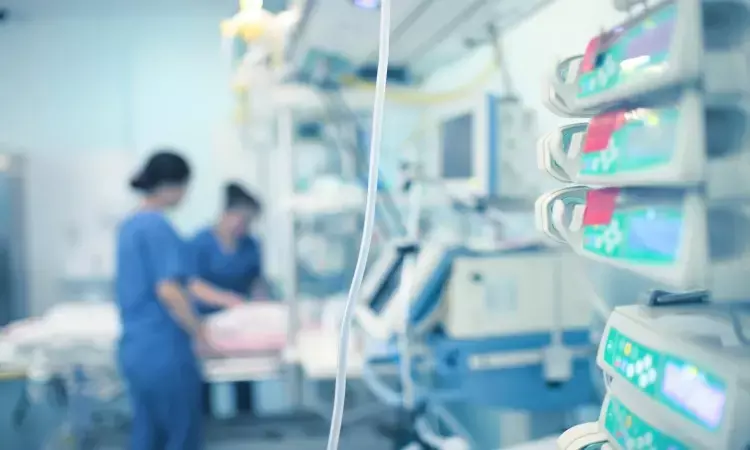- Home
- Medical news & Guidelines
- Anesthesiology
- Cardiology and CTVS
- Critical Care
- Dentistry
- Dermatology
- Diabetes and Endocrinology
- ENT
- Gastroenterology
- Medicine
- Nephrology
- Neurology
- Obstretics-Gynaecology
- Oncology
- Ophthalmology
- Orthopaedics
- Pediatrics-Neonatology
- Psychiatry
- Pulmonology
- Radiology
- Surgery
- Urology
- Laboratory Medicine
- Diet
- Nursing
- Paramedical
- Physiotherapy
- Health news
- Fact Check
- Bone Health Fact Check
- Brain Health Fact Check
- Cancer Related Fact Check
- Child Care Fact Check
- Dental and oral health fact check
- Diabetes and metabolic health fact check
- Diet and Nutrition Fact Check
- Eye and ENT Care Fact Check
- Fitness fact check
- Gut health fact check
- Heart health fact check
- Kidney health fact check
- Medical education fact check
- Men's health fact check
- Respiratory fact check
- Skin and hair care fact check
- Vaccine and Immunization fact check
- Women's health fact check
- AYUSH
- State News
- Andaman and Nicobar Islands
- Andhra Pradesh
- Arunachal Pradesh
- Assam
- Bihar
- Chandigarh
- Chattisgarh
- Dadra and Nagar Haveli
- Daman and Diu
- Delhi
- Goa
- Gujarat
- Haryana
- Himachal Pradesh
- Jammu & Kashmir
- Jharkhand
- Karnataka
- Kerala
- Ladakh
- Lakshadweep
- Madhya Pradesh
- Maharashtra
- Manipur
- Meghalaya
- Mizoram
- Nagaland
- Odisha
- Puducherry
- Punjab
- Rajasthan
- Sikkim
- Tamil Nadu
- Telangana
- Tripura
- Uttar Pradesh
- Uttrakhand
- West Bengal
- Medical Education
- Industry
Golden hour in trauma patients: Delayed treatment linked to disability and death

Exploring the golden hour:
Whether rapid transportation can benefit patients with trauma remains controversial. The researchers conducted a study to determine the association between prehospital time and outcome to explore the concept of the "golden hour" for trauma patients.
Some clinicians consider that after a traumatic injury, patients are most likely to survive if they receive medical treatment within one hour--the so-called "golden hour."
A new study led by Chiang Wen-Chu at National Taiwan University Hospital, Yunlin Branch, and published October 6th, 2020 in PLOS Medicine, explores that idea, finding that longer delays in treatment could increase a patient's risk of disability or death.
While the concept of the golden hour was first proposed in the 20th century, studies have offered conflicting results over whether treatment in the first hour is vital to survival. Wen-Chu and his colleagues investigated this idea through a retrospective study of more than 24,000 trauma patients in Japan, Malaysia, Korea and Taiwan, who were transported to a hospital by emergency services between 2016 and 2018. The authors used statistical methods to identify relationships between the "prehospital time" before treatment and patient outcomes, taking into account factors such as age, sex, type and severity of the injury, and any prehospital medical treatments. Overall, the length of prehospital time was not related to a patient's risk of dying within 30 days of the trauma incident, but every 10-minute delay was associated with a 6% increase (95% confidence intervals 4-8%, p<0.001) in the odds of a poor outcome, such as a severe disability.
The authors support the idea of the golden hour because their findings suggest that rapid transportation may be associated with reduced risk that a patient will suffer poor quality of life or be unable to return to normal daily activities after an injury. Multiple factors can affect how long it takes a trauma patient to reach the hospital, including the response speed of emergency services, the distance to the hospital and the severity of the patient's condition. Additionally, the authors urge emergency services staff to make the most of that prehospital time, to promote the best possible outcomes for patients.
Hina Zahid Joined Medical Dialogue in 2017 with a passion to work as a Reporter. She coordinates with various national and international journals and association and covers all the stories related to Medical guidelines, Medical Journals, rare medical surgeries as well as all the updates in the medical field. Email: editorial@medicaldialogues.in. Contact no. 011-43720751
Dr Kamal Kant Kohli-MBBS, DTCD- a chest specialist with more than 30 years of practice and a flair for writing clinical articles, Dr Kamal Kant Kohli joined Medical Dialogues as a Chief Editor of Medical News. Besides writing articles, as an editor, he proofreads and verifies all the medical content published on Medical Dialogues including those coming from journals, studies,medical conferences,guidelines etc. Email: drkohli@medicaldialogues.in. Contact no. 011-43720751


